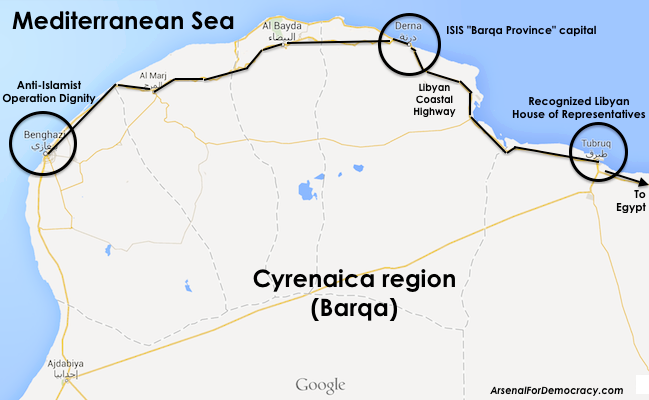Breaking news from Al Arabiya:
Egypt’s military said it bombed ISIS targets in Libya at dawn on Monday, following the execution of a group of Egyptian Copts by the militant group.
On Sunday, ISIS released a video purportedly showing the beheading of 21 Egyptians captured in Libya. President Abdel Fattah al-Sisi called an urgent meeting of Egypt’s top national security body after the video was released.
Sisi also gave a televised address, saying that Egypt and the world are facing “ferocious threats” hailing from radical militants, who are “devoid of any humane sense.”
He said his country reserved the right to “punish these murderers” as he called a meeting of security chiefs and declared seven days of mourning after the video was distributed by militants on social media.
You can read more on Sisi’s Right-to-Respond speech early Monday morning, from The Cairo Post. (Note: President Sisi, “elected” with nearly 100% of the vote in the elections following his 2013 military coup, is a conservative anti-Islamist militarist with a tight grip on local media.)
Most if not all of the airstrikes reported so far by people on the ground occurred in Derna. As Arsenal For Democracy explored in depth in our November 2014 article “Derna: ‘Islamic State’ proclaims 2nd ‘province’ in Libya”, the city of Derna was the beachhead for returning Libyan veteran fighters of the successful ISIS campaigns into Iraq in 2013 and 2014, and it has become the headquarters of the major ISIS affiliate in Libya. Since that post, however, at least two additional “ISIS provinces” have been proclaimed in the country’s historic three provinces. The group has staged attacks in Tripoli and elsewhere, but the execution of 21 Egyptian Copts at Sirte was the most brazen episode yet.

Road map showing ISIS-Libya positions (in Derna) relative to Tobruk and Benghazi within the greater Cyrenaica (Barqa) region of eastern Libya.
The executions may have provided Sisi’s pretext for a long-anticipated full-scale Egyptian military intervention in Libya, following non-admitted more limited/outsourced aerial engagements in Benghazi in October and its non-admitted assistance with the covert United Arab Emirates air operation in Libya in August. This is the first publicly confirmed operation by Egypt in its neighbor.
It may also put western Libyan pro-GNC Islamist militias that oppose ISIS in an awkward position. They vowed yesterday to begin operations against ISIS at Sirte, but they also oppose the faction Egypt has aggressively backed. A wider Egyptian intervention would be almost certainly directed at all Islamist groups, not just ISIS, much as Egypt’s internal military operations have been aimed equally at ISIS of Sinai as at the Muslim Brotherhood.
Back home in Egypt, the incident is likely to have a similar rallying effect to that seen in Jordan after its pilot was executed. However, there is an added religious dimension, as the regime is plainly exploiting existential fears of the minority Egyptian Coptic Christian community to compel them to rally to the regime despite its relative non-attention to their security. Returning the Al Arabiya article:
Egypt’s Coptic Orthodox church said it was “confident” that those who purportedly beheaded a group of Egyptian Copts in Libya will be punished.
“The Orthodox church … is confident its homeland would not rest until the evil perpetrators get their fair retribution for their wicked crime,” the Coptic church said in a statement on its Facebook page.
On another front, in an unusually militaristic statement from the Italians — currently under a center-left government that is grappling with unpopular economic reforms under a very young leader and with a rising Libyan refugee crisis — Libya’s former colonial occupier formally called for an international military coalition against Libya’s jihadists and said it was “ready to lead” such a coalition. That’s probably the last thing Libya needs in the current climate there. Such an intervention would almost assuredly receive a much less warm welcome than the 2011 NATO air campaign in the country against Qaddafi.
The vastly more populous and heavily armed country of Yemen, embroiled in civil war, continues to garner substantially less coverage than massive oil producer, low-population Libya.


